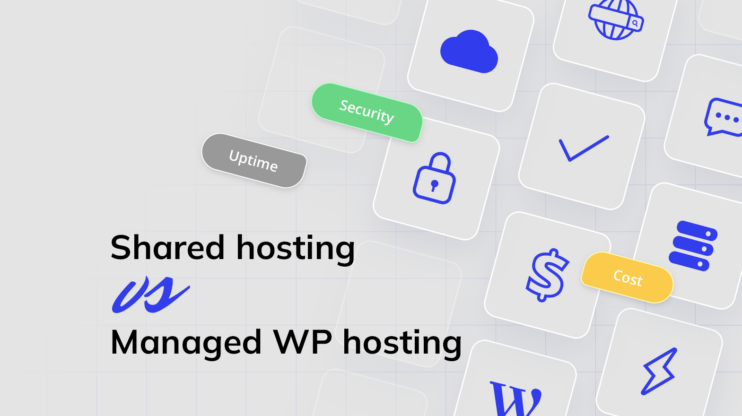Cloud Hosting vs VPS Hosting: Are you wondering which one to choose? First, it’s important to understand the key differences that impact performance, scalability, and control. Cloud Hosting offers a highly scalable, flexible solution by using a network of virtual servers, while VPS Hosting provides dedicated resources within a single physical server, offering more control at a lower cost. This article will explain the advantages, disadvantages, and ideal use cases for both Cloud and VPS Hosting, helping businesses make informed decisions.
As more websites move online, hosting offers great opportunities to improve your digital presence. Cloud Hosting is known for its flexibility and reliability, making it perfect for businesses that need to grow or handle changing demands. In contrast, VPS Hosting is a budget-friendly choice, giving users more control and consistent performance when they need dedicated resources.
FAQ
Is cloud hosting better than VPS hosting?
What is the difference between Storage VPS and Cloud VPS?
Is Cloud Hosting better than Web Hosting?
What is Cloud Hosting?
Cloud Hosting is a method of hosting websites and applications using virtual servers that pull computing resources from a vast network of physical servers. The key features of Cloud Hosting include scalability and high availability, offering flexible solutions that can adjust to changing demands.
How does Cloud Hosting work?
Cloud Hosting operates by distributing data across multiple connected servers in a network. These servers form what is known as the cloud. This decentralized approach allows for data and resources to be accessed easily and quickly from any location through an internet connection. Cloud providers manage these networks and ensure that the necessary resources are always available.
Using Cloud Hosting, businesses can achieve high scalability. This means they can add or reduce computing resources like CPU, RAM, and storage based on current needs without interruptions. Cloud Hosting options generally include public and private clouds, with each option offering different levels of privacy and control. The pay-as-you-go pricing model is common, charging users based on the resources they use. It helps to manage costs effectively.
Advantages of Cloud Hosting
Cloud Hosting has many important advantages to take into account.
- Scalability: Cloud Hosting allows you to easily scale resources up or down based on your business needs or traffic demand. Whether you need more storage, bandwidth, or processing power, adjustments can be made without the need for physical hardware changes.
- High availability and uptime: One of the key advantages of Cloud Hosting is its high availability. Data is distributed across multiple servers, which ensures that even if one server fails, others will keep the system running smoothly. This significantly reduces downtime and improves reliability for critical applications.
- Cost-efficiency: Cloud Hosting often follows a pay-as-you-go pricing model, meaning businesses only pay for the resources they use. This eliminates the need for large upfront investments in hardware and infrastructure. Thus, it is a cost-effective option for companies of all sizes.
- Remote access and flexibility: With Cloud Hosting, data and applications can be accessed from anywhere, as long as there’s an internet connection. This is ideal for businesses with remote teams, as it enables employees to collaborate in real-time from various locations.
- Security: Cloud Hosting providers often implement advanced security measures, such as automated backups, data encryption, and disaster recovery options. These features help protect sensitive information and minimize the risk of data loss or breaches.
Disadvantages of Cloud Hosting
While Cloud Hosting has many advantages, there are some challenges to consider.
- Dependence on internet reliability: The performance of Cloud Hosting heavily relies on internet connectivity. If you experience slow or unreliable internet, it can negatively impact the performance of cloud-hosted applications and services, leading to downtime or slow loading times.
- Data security concerns: Since Cloud Hosting involves shared infrastructure, there’s an increased risk of unauthorized access or data breaches. Although providers typically implement strong security measures, the shared environment can still pose potential vulnerabilities for sensitive data.
- Hidden costs: While the pay-as-you-go model is a major benefit, Cloud Hosting can come with hidden fees, such as data transfer costs or overage charges. If not closely monitored, these fees can add up quickly and affect your budget unexpectedly.
- Compliance and data privacy issues: Depending on the location of the Cloud Hosting provider’s data centers, businesses may face challenges with compliance and data privacy regulations, such as GDPR or HIPAA. This can be problematic for industries with strict legal requirements for handling data.
What is VPS Hosting?
VPS hosting, or Virtual Private Server hosting, provides a balance between Shared Hosting and Dedicated Server Hosting. It allows users to have dedicated resources and more control over their server environment.
How does VPS Hosting work?
VPS Hosting uses virtualization technology to divide a physical server into multiple virtual servers. Each virtual server acts independently, with its own operating system and dedicated resources like CPU, RAM, and storage. This setup gives users the control to install software and manage the server settings as they see fit.
Managed VPS comes with support and maintenance services, while unmanaged VPS requires users to handle these tasks themselves. VPS Hosting provides more flexibility and performance compared to shared hosting, making it suitable for websites that need more resources.
Try 10Web for free, and enjoy all the benefits of a secure Google Cloud Partner hosting and 10Web's AI Website Builder.![]()
#1 Managed WordPress Hosting
Advantages of VPS Hosting
VPS hosting has many advantages which might benefit your business needs and goals. Let’s learn what those are.
- Dedicated resources: VPS Hosting provides dedicated resources such as CPU, RAM, and storage, ensuring consistent performance without interference from other users on the server.
- Enhanced performance: With exclusive access to these resources, VPS Hosting delivers fast load times and good overall performance.
- Greater control and customization: VPS Hosting offers root access, allowing users to install custom software, configure server settings, and manage security protocols according to their specific needs.
- Cost-effective solution: VPS Hosting offers many of the benefits of Dedicated Hosting, such as isolation and control, at a much lower cost.
- Improved security: The virtual environment of a VPS is isolated from other users, reducing the risk of data breaches and offering greater protection compared to Shared Hosting.
- Scalability: VPS Hosting allows for easy scalability, enabling you to upgrade resources like CPU, RAM, and storage as your website or application grows, without the need for migration.
- Stability and reliability: Since other users do not share your resources, the performance of your site remains stable and is less affected by spikes in traffic or problems from other accounts on the server.
Disadvantages of VPS Hosting
Next to the advantages, VPS Hosting also has some disadvantages you should consider. Let’s learn what those are.
- Complexity in management: VPS Hosting requires technical knowledge for server configuration, maintenance, and security management, making it more complex compared to shared hosting.
- Shared hardware limitations: Although resources are dedicated, multiple VPS accounts share the same physical server, meaning performance could still be limited by the underlying hardware.
- Fixed resource allocation: While VPS Hosting provides dedicated resources, these allocations are typically fixed, meaning if your site outgrows them, you may need to upgrade your plan or server configuration.
Similarities of Cloud Hosting and VPS Hosting
Cloud Hosting and VPS Hosting both serve as effective options for hosting websites and applications. Let’s learn more about their similarities.
Both provide a virtual environment that mimics a physical server, offering resources like CPU, RAM, and storage.
Security features like firewalls and regular updates are common with both hosting types. Users can rely on these protections to keep their data safe from threats.
Both hosting options offer customization and control. Users can manage their server configurations, choose the software they need, and set up their environment according to their requirements. This flexibility allows users to tailor their hosting environments without extensive limitations.
Scalability is another shared feature. Both Cloud and VPS Hosting allow users to adjust resources like RAM or CPU based on changing needs. This adaptability helps businesses manage traffic spikes smoothly.
In terms of performance, both systems provide dedicated resources for every user. This means that actions by other users on the server won’t affect the performance of a website or app. Each plan is designed to maintain consistent resource allocation.
Support is often available with both hosting types to assist users with technical issues. Whether through email, chat, or phone, hosting providers ensure that users have access to the help they need.
These similarities make cloud and VPS Hosting suitable for users needing dependable and flexible hosting solutions. Such features cater to a wide variety of users seeking various capabilities and configurations.
Differences between Cloud Hosting and VPS Hosting
Cloud Hosting and VPS Hosting offer different ways to manage online data and website performance. They each have unique features that suit various needs.
Cloud Hosting uses multiple servers to provide resources. This setup allows for dynamic scalability, meaning resources can easily adjust based on traffic demands. If one server fails, others can step in to keep services running smoothly.
In contrast, VPS Hosting uses a single physical server divided into virtual compartments. Each compartment works independently, like a dedicated server. This setup offers more control over settings and resources but may not handle traffic spikes like Cloud Hosting.
Cloud Hosting generally offers higher reliability because of its server network. If one server experiences issues, others provide backups. VPS hosting, on the other hand, relies on one physical server, which can be a drawback if it fails.
Cloud Hosting is suitable for businesses needing flexible resource scales and high uptime. VPS Hosting is great for users wanting more control over their environment without the need for multiple servers. Both Cloud Hosting and VPS Hosting have significant roles in the web hosting landscape.
| Comparison Point | Cloud Hosting | VPS Hosting |
|---|---|---|
| Performance | Utilizes multiple servers for enhanced performance and load balancing. | Performance depends on the physical server’s resources and the number of users sharing it. |
| Scalability | Highly scalable; resources can be adjusted dynamically based on needs. | Limited scalability; requires manual upgrades or migrations to larger VPS plans. |
| Reliability | More reliable as downtime on one server is compensated by others. | Less reliable if the physical server goes down, affecting all hosted VPSs. |
| Management | Often fully managed by the hosting provider. | Can be self-managed or managed depending on the plan chosen. |
| Customization | Limited to the options provided by the hosting platform. | Greater control over server configurations, software, and environment. |
| Security | Security is generally high but shared infrastructure may pose risks. | Dedicated server environment offers better security control, but it requires user management. |
| Migration | Easy to migrate due to its distributed architecture. | Requires more effort, as it depends on the new server configuration. |
| Cost | Typically pay-as-you-go, which can be more economical for variable traffic. | Fixed pricing, often more affordable for stable and predictable usage. |
Which one is best for you: considerations before making a choice
To make a good choice between Cloud Hosting and VPS Hosting, you should first consider your specific needs, goals, and technical capacity. To help you decide, here are some key factors to consider:
- Scalability needs: Do you expect rapid growth or unpredictable traffic spikes? Cloud Hosting offers more flexibility and easy scalability.
- Cost control: Are you looking for predictable costs, or do you prefer a pay-as-you-go model? VPS Hosting offers fixed costs, while Cloud Hosting charges based on actual resource usage.
- Technical expertise: How comfortable are you with server management? VPS Hosting provides more control but may require technical know-how, whereas Cloud Hosting is easier to manage.
- Performance and uptime: Do you prioritize high availability and uptime? Cloud Hosting spreads resources across multiple servers, reducing downtime risk. If you select 10Web’s Cloud Hosting solution, you will get strong reliability, since it distributes resources across multiple servers to ensure minimal downtime.
- Customization: Do you need custom configurations or software installations? VPS Hosting provides more flexibility and control for advanced setups.
- Security concerns: Is data privacy a critical factor for your business? VPS Hosting offers isolated environments, which may provide added security compared to Cloud Hosting’s shared infrastructure.
After evaluating these factors, you can choose the hosting solution that best aligns with your business’s needs and growth prospects.
Conclusion
To wrap up, both Cloud Hosting and VPS Hosting have their strengths and are suitable for different needs. Cloud Hosting has great scalability, reliability, and flexibility, which make it an ideal choice for users who expect growing or changing demands.
VPS Hosting, in turn, offers more control, customization, and a stable pricing model, which is attractive for those who need dedicated resources and are comfortable managing their own server. The choice between the two depends on your specific requirements, budget, and technical capabilities, ensuring that you select the option that goes best with your needs.
Try 10Web for free, and enjoy all the benefits of a secure Google Cloud Partner hosting and 10Web's AI Website Builder.![]()
#1 Managed WordPress Hosting









